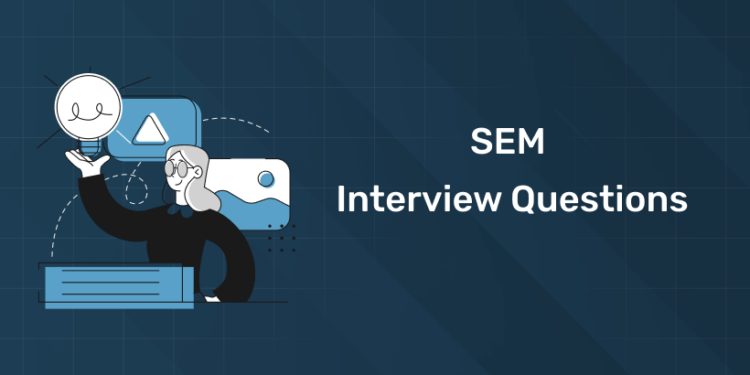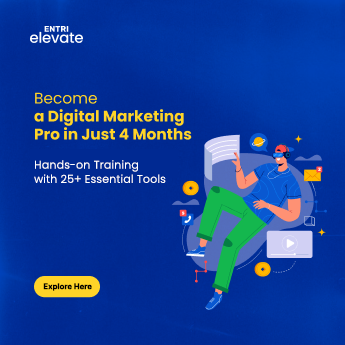Table of Contents
Search Engine Marketing (SEM) is a big part of digital marketing and is all about getting your website to show up on search engine results pages (SERPs) through paid advertising. As businesses continue to invest in SEM to drive traffic and generate leads the demand for SEM professionals is on the rise. This post will go through SEM interview questions to help you prepare and stand out in your interview.
SEM Interview Tips
Before we get into the questions here are some tips to help you prepare for an SEM interview:
- Know the Basics: Make sure you have a good understanding of SEM principles, how search engines work, the difference between SEO and SEM and the basics of pay-per-click (PPC) advertising.
- Stay Current: SEM is a fast paced industry that is constantly changing with new updates and trends. Stay up to date with the latest algorithm changes, advertising policies and industry best practices.
- Familiar with Tools: Get hands on experience with SEM tools such as Google Ads, Bing Ads, SEMrush, Ahrefs and Google Analytics. Be prepared to talk about how you have used these tools in your previous roles.
- Practice Data Analysis: SEM involves a lot of data analysis. Be comfortable with reading metrics, generating reports and making data driven decisions.
- Prepare Real Life Examples: Be ready to talk about specific campaigns you have worked on, goals, strategies implemented, challenges faced and results achieved.
SEM Interview Questions and Answers
1: What is the primary goal of SEO (Search Engine Optimization)?
1. What is SEM and how is it different from SEO?
Answer: SEM stands for Search Engine Marketing and is about promoting websites by getting them to show up on search engine results pages through paid advertising. SEO, or Search Engine Optimization, is about optimizing a website to rank higher in organic (non-paid) search results. SEO is about long term sustainable traffic and SEM is about immediate visibility and results through paid ads.
2. What is the structure of a Google Ads campaign?
Answer: A Google Ads campaign is structured in three layers: Account, Campaigns and Ad Groups. At the account level you manage billing and user access. Campaigns is the next level where you define your marketing goals, budget and targeting settings. Within each campaign Ad Groups contain a set of related ads and keywords.
3. How do you do keyword research for an SEM campaign?
Answer: Keyword research is about identifying keywords that potential customers are using to search for products or services. Tools like Google Keyword Planner, SEMrush and Ahrefs can help you find keywords with high search volume and low competition. Consider the intent behind keywords, informational, navigational and transactional to target the right audience.
Learn Digital Marketing Fundamentals! Get Free Demo Here!
4. What is Quality Score?
Answer: Quality Score is a Google Ads metric that measures your ad, keyword and landing page quality. It affects your ad rank and CPC. Higher Quality Score means better ad performance, lower costs and higher ad position. CTR, ad relevance and landing page experience are the factors that affect Quality Score.
5. How do you write ad copy?
Answer: A good ad copy should be relevant, short and engaging. It should have a strong headline, clear value proposition and a call-to-action (CTA). Use keywords in the ad copy to make it more relevant to the search query. Highlight unique selling points and benefits to get clicks.
6. What are negative keywords and how do you use them?
Answer: Negative keywords are terms you exclude from your campaigns to prevent your ads from showing on irrelevant searches. By using negative keywords you can filter out unwanted traffic, improve CTR and reduce wasted ad spend. Review and update your negative keyword list regularly based on search term reports.
7. How do you measure SEM campaign success?
Answer: SEM campaign success can be measured by key performance indicators (KPIs) such as CTR, conversion rate, CPC, ROAS and overall ROI. Analyze these metrics to see how your campaign is performing and where to improve.
8. What are the different bidding strategies in Google Ads?
Answer:
- Manual CPC: Set your own max CPC for each ad.
- Enhanced CPC: Automatically adjusts your manual bids to get more conversions.
- Target CPA: Set your target cost-per-acquisition and Google will adjust bids to achieve it.
- Target ROAS: Set your target return on ad spend and Google will adjust bids accordingly.
- Maximize Clicks: Automatically sets bids to get most clicks within your budget.
- Maximize Conversions: Automatically sets bids to get most conversions within your budget.
9. How do you optimize landing page?
Answer: To optimize a landing page make sure it’s relevant to the ad copy and keywords, has a clear and strong headline, has a call-to-action (CTA) and is user friendly with fast load times. Use A/B testing to compare different versions of the landing page and see what works best. Analyze user behavior and feedback to get insights to improve.
10. What is ad rank and how is it determined?
Answer: Ad rank is the position of your ad on the search engine results page. It’s calculated based on your bid, Quality Score and the expected impact of ad extensions and other ad formats. Higher ad rank means better ad position and more visibility.
11. How do you allocate budget in an SEM campaign?
Answer: Budget allocation is about spreading your budget across different campaigns, ad groups and keywords based on performance and business goals. Monitor each segment and adjust the budget to maximise ROI. Use budget bid simulators and performance forecasts to make informed decisions.
12. What is remarketing and how does it work?
Answer: Remarketing allows you to show ads to people who have visited your website but didn’t convert. It uses cookies to track visitors and show relevant ads as they browse other sites. Remarketing helps re-engage potential customers, increase brand awareness and drive conversions.
Achieve exceptional results with Digital marketing techniques! Enroll Here!
13. How do you do a competitive analysis in SEM?
Answer: Competitive analysis is about researching your competitors’ SEM strategies, including their keywords, ad copy, landing pages and bidding strategies. Tools like SEMrush, SpyFu and Ahrefs can give you insights into your competitors’ performance. Use this information to find opportunities and improve your own campaigns.
14. What’s the difference between broad match, phrase match and exact match keywords?
Answer: Broad match keywords trigger ads on searches that include variations, synonyms and related terms. Phrase match keywords trigger ads on searches that include the exact phrase or close variations. Exact match keywords trigger ads on searches that match the exact keyword or close variations. Each match type offers different levels of control and reach.
15. How do you use ad extensions in Google Ads?
Answer: Ad extensions add extra information and visibility to your ads. Common ad extensions are site link extensions, callout extensions, structured snippets, call extensions and location extensions. Use ad extensions to provide more context, increase CTR and improve ad performance.
16. What’s the role of A/B testing in SEM?
Answer: A/B testing is about comparing two versions of an ad, landing page or other elements to see which one performs better. It helps you find the best variations and optimise for better results. Test different headlines, ad copy, images, CTAs and landing page designs.
17. How do you handle seasonal trends in SEM campaigns?
Answer: Adjust your SEM strategy based on seasonal trends and consumer behaviour. Analyse historical data to find peak periods and allocate your budget accordingly. Create seasonal ad copy and promotions to target your audience during specific times of the year.
18. What’s click-through rate (CTR) and why is it important?
Answer: CTR is the number of clicks divided by impressions and measures how well your ad is performing in generating interest. A higher CTR means your ad is relevant and engaging to the audience. It also affects your Quality Score and ad rank.
19. How do you use Google Analytics to track SEM?
Answer: Google Analytics gives you insights into user behaviour, traffic sources and conversion tracking. Use it to track your SEM campaigns, analyse metrics like bounce rate, session duration and conversion rate and make data driven decisions for the ad campaigns.
20. Why is landing page experience important in SEM?
Answer: Landing page experience is key to Quality Score and ad performance. A good landing page experience means users find relevant, useful and easy to navigate content and higher conversion rates and better ad positions.
21. How do you optimize ad spend for ROI?
Answer: Optimize ad spend by focusing on high performing keywords, adjust bids based on performance, use negative keywords to filter out irrelevant traffic and continuously monitor and refine your campaigns. Try to get the highest ROI by using your budget wisely.
22. What is the difference between CPM and CPC?
Answer: CPM (Cost Per Thousand) is a bidding model where you pay for every thousand impressions of your ad. CPC (Cost Per Click) is a bidding model where you pay for each click on your ad. Choose accordingly to your campaign goals and budget.
23.What do you understand about Google KPI in AdWords?
Answer: A Google AdWords KPI is a quantifiable, open performance metric that is used to track, evaluate, and continuously improve the effectiveness of particular Search Engine Advertising (SEA) strategies and tactics inside the Google network.
24.What’s a good AdWords quality score?
Answer: AdWords Quality Score is a 1-10 keyword level score. You get a Quality Score for each keyword in your Google Ads account. An 8-10 is good. CTR, landing page experience and ad relevance are the factors that determine your Quality Score. Same keywords in different ad groups will have different Quality Scores because the ad groups have different ad creative, landing pages and demographic targeting.
25.What is pay per click?
Answer: Pay-per-click (PPC) is a type of online advertising where advertisers pay publishers a fee for each click on their ad. It’s a common way to increase traffic to your website. The most popular and widely used PPC marketing strategy is search engine marketing.
26.When Do You Need To Implement SEM For Your Business?
Answer: When you think your product is ready and marketable and your business has the kind of audience who will buy your product/service or you can build an audience persona and know what resonates with them. Also When you have expertise in capturing a category instead of creating one because SEM is based on high intent searches and you must know if people are searching for my kind of product or service and if yes the location and other factors as well. For example if you are into the business of selling tennis shoes in India then tier-1 and tier-2 cities should be your hot destination instead of tier-3 or 4.
Launch your career in digital marketing with our comprehensive course. Enroll now!
Become an AI-powered Digital Marketing Expert
Master AI-Driven Digital Marketing: Learn Core Skills and Tools to Lead the Industry!
Explore CourseConclusion
Keywords decide the success or failure of a digital marketing campaign. Thus, choosing the right keyword for your business is imperative, and interviewers try to understand your process of a keyword search with this question. Additionally, they want to test your skills and knowledge on different back-end operations. So, keep these things while answering this question.
You can increase your knowledge about different back-end operations by pursuing an advanced online course that will educate you on new digital marketing trends and contemporary business practices, among others with entri’s digital marketing course.
Are you aspiring for a booming career in IT? Then check out |
|||
Best Digital Marketing training Course |
Python Programming Course |
Data Science and Machine Learning Course |
Software Testing Course |
Frequently Asked Questions
What is SEM?
SEM (Search Engine Marketing) is a digital marketing strategy used to increase the visibility of a website on search engine results pages (SERPs) through paid advertising.
How can I prepare for an SEM interview?
To prepare for an SEM interview, understand SEM principles, stay updated on industry trends, familiarize yourself with SEM tools, practice data analysis, and be ready to discuss real-life campaign examples.
What are the key metrics to measure SEM performance?
Key metrics include Click-Through Rate (CTR), Cost Per Click (CPC), Conversion Rate, Quality Score, and Return on Ad Spend (ROAS).
How do you set a budget for an SEM campaign?
Setting a budget involves considering factors like business goals, competition, keyword costs, and historical campaign performance.
What tools are essential for managing SEM campaigns?
Essential tools include Google Ads, Bing Ads, Google Analytics, SEMrush, and Ahrefs for managing and optimizing SEM campaigns effectively.












